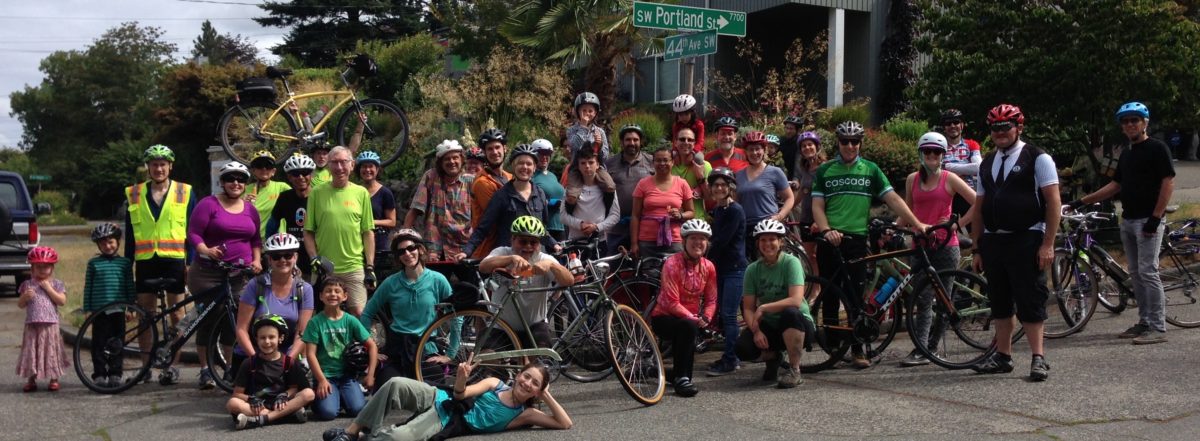With Duwamish Valley Safe Streets, we support SDOT’s proposal to add a two-way protected bike lane on West Marginal Way SW from West Marginal Place SW to the crosswalk at the north end of the Duwamish Trail.
This will fill in the missing link in the Duwamish Trail, a regional bike route leading to the Alki Trail, West Seattle Junction, South Park, Georgetown, Green River Trail, SODO, Downtown Seattle, and the Mountains to Sound Trail. The route serves marginalized and underserved communities in the Duwamish Valley. This route is critical for all bike traffic between northern West Seattle and Greater Seattle at times when the Spokane Street Bridge is closed to bike traffic for inspections and repairs.


A significant benefit of the protected bike lane will be to improve traffic safety for all road users by slowing down speeding southbound traffic on West Marginal Way SW.
Crashes are frequent and severe. Median speeds were in the mid-40’s and did not come down after speed limits were lowered to 30. Now speed radar signs are up, resulting in only about a 5 mph reduction. There is no congestion problem southbound due to lane capacity. There is a speeding and reckless driving problem, causing crashes and making it treacherous to cross on foot. Traffic congestion only occurs at the south end at the Highland Park Way intersection, where the backup from the First Avenue South Bridge begins. Along most of West Marginal Way SW, frantic drivers are rushing to get into the traffic jam as fast as they can. To hurry up and wait. Making more of the north end consistently one lane will allow drivers who travel at or near the speed limit to control the speed of all traffic, without any effect on throughput across the bridges. The bridges are the choke points, not the street.

For the short distance between the Duwamish Trail crossing and the Duwamish Longhouse & Cultural Center, we support SDOT’s option to allow parking in the curb lane north of the new signal and crosswalk. This will eliminate the current illegal use of the sidewalk area for parking that blocks pedestrian access.


Port of Seattle and Seattle Freight Advisory Board members are concerned about losing a traffic lane and about truck maneuvering at drives. We support their goals for good, efficient truck routes including on West Marginal Way SW. Our members and our neighbors are employed by these industries, and we all depend on them. We support SFAB’s request to maintain traffic lane width meeting standards for this Major Truck Street. However, we think the concerns about the PBL are not justified. Some industrial users also want lower traffic speeds, to help them get in and out of their driveways safely. Making the southbound direction continuously one lane from the Chelan intersection to the Duwamish Longhouse & Cultural Center will eliminate the Freight Board’s concerns about traffic merging from two lanes to one approaching SW Alaska Street. If it turns out we are mistaken and SFAB’s fears are realized, the PBL would be easily reversible. If it turns out we are correct, this would help tame a free-for-all speedway into a street that prioritizes freight for industries and the seaport, but also safely accommodates people on bikes and walking as well as people driving personal cars and trucks.
Building a sidewalk where it is missing on the west side will provide a safer, more comfortable walking route from the nearest bus stops on SW Spokane St and on Delridge Way SW to the industrial employers and the Duwamish Longhouse & Cultural Center. However, sidewalks are not a safe substitute for protected bike lanes in the roadway, due to narrow width and poor sightlines at driveways where buildings are built to the property line at the street. Some have suggested cutting all the street trees to widen the sidewalk to the curb. Cutting more than two dozen healthy street trees would be contrary to City policy and would put cyclists just inches away from the most reckless drivers passing traffic on the right at speeds often exceeding 50 mph, making the route less safe.
 We appreciate the proactive effort from SDOT to improve safety and mobility on West Marginal Way SW. We also appreciate the ongoing community outreach and engagement to make this work responsive to the needs of all people traveling on this important corridor.
We appreciate the proactive effort from SDOT to improve safety and mobility on West Marginal Way SW. We also appreciate the ongoing community outreach and engagement to make this work responsive to the needs of all people traveling on this important corridor.






